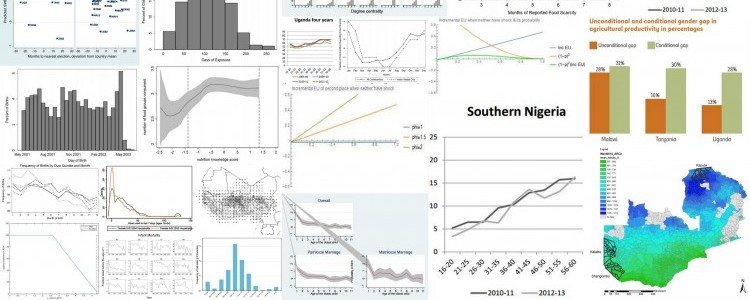
The INCLUDE team’s reading list: March 2021
One of INCLUDE’s core beliefs is that so much knowledge already exists, it just needs guiding to the right places and the right people in order to reach its full impact for policy and, ultimately, for development. March was a rich month in terms of new evidence and publications – in this latest edition of our monthly reading list, we share a selection of what our secretariat members have been reading in their various areas of expertise. Whether you are seeking information to guide policy, embarking upon a piece of research, or simply interested in broadening your knowledge and staying updated on inclusive development in Africa, we hope this source can be a good starting point.
- Cash in emergencies toolkit – The British Red Cross have developed a toolkit for delivering effective cash transfers during emergency situations. The toolkit includes steps for preparedness (scenario and risk analyses, standard operating procedures, planning service providers), action (rapid market assessments, determining modality, value and selection criteria), implementation (protocols for registration, distribution and communication) and monitoring and evaluation.
- State of school feeding worldwide 2020 – This report by the World Food Programme describes key aspects of coverage, implementation practices and costs of school-based health and nutrition programmes worldwide. The publication describes the damage caused by the COVID-19 pandemic to school-feeding programs, and presents what can be done to restore this remarkable global safety net.
- Cash in the city: emerging lessons from implementing cash transfers in urban Africa – This paper captures early lessons from a new generation of urban cash transfer responses to Covid-19 in eleven African countries. The analysis contextualizes such initiatives within a longer-term trajectory of urban social protection programs from the early 2000s. A range of lessons emerge around design and implementation, partnerships, institutions and political economy, strategic issues, and evidence and learning
- Pathways out of Extreme Poverty Tackling Psychosocial and Capital Constraints with a Multi-faceted Social Protection Program in Niger – The World Bank compares the impact of receiving a lump-sum cash grant, psychosocial support, none, or both, upon graduating from a national cash transfer program targeting women in Niger. All three treatments generate large impacts on consumption and food security 6 and 18 months post-intervention, increase participation and profits in women-led off-farm business and livestock activities, and improve various dimensions of psychosocial well-being. These results highlight the value of addressing psychosocial constraints as well as capital constraints in government-implemented poverty reduction and economic inclusion programs.
- Improving education through quality teaching: evidence from the African Education Research Database -Education Sub Saharan Africa (ESSA) partnered with the Research for Equitable Access and Learning (REAL) centre at the University of Cambridge to develop the African Education Research Database, with over 4,000 pieces of research by scholars in Africa. This article is based on a comprehensive synthesis of this database, and sheds light on the theme ‘teachers and teaching’, covering aspects of teacher education, teaching methods and teacher workforce management.
- Reaching African audiences in their mother tongue: one film’s ongoing legacy – Over 2,000 languages are spoken in Africa, but millions of school pupils aren’t taught in their mother tongue. Intrigued by the disconnect between the languages spoken at home by children in Zambia and the English of their education, Alastair Cole and Nick Higgins created a documentary about the linguistic experience of children in the classroom. The film was made over 9 months, and then made freely available 30 languages – 27 African languages, plus English, French and Portuguese. Film reached over 200,000 people and sparked a social media campaign on the experiences of a monolinguistic education system.
- The GPE Knowledge and Innovation Exchange (KIX) Observatory on COVID-19 Responses in Africa’s Educational Systems – This consortium initiative analyses the consequences of school closures on primary and secondary education under two streams: the operation of education systems, and the well-being of the learner. The first stream includes teaching and learning, curriculum review/reform and education system resilience, while elements for the second stream relate to nutrition, school health, psychological and psychosocial support. Straddling the two streams are the cross-cutting issues of gender, equity and inclusion.
- Inclusion of young people living with disabilities in TVET – This mini report by ESSA highlights how young people living with disabilities can be supported to gain employment through participation in TVET, focusing on access, learning, and transition to work.
- Africa’s infrastructure paradox – Despite high demand for projects, sufficient supply of capital and investors, and voluminous potential projects, there is insufficient investment in infrastructure projects within the region, with one of the biggest gaps for sub-Saharan Africa being access to reliable electricity. A recent publication by McKinsey and Company finds that 80 percent of infrastructure projects in Africa fail at the feasibility and business-planning stage.
- Digital Rights in Closing Civic Space: Lessons from Ten African Countries – This study by the African Digital Rights Network (ADRN) documents 115 examples of technologies, tactics and techniques used by African governments in the last two decades to control or censor the internet, affecting citizens’ digital rights, their ability to organise, voice opinions and participate in governance online, and the ability to achieve the kind of inclusive governance defined in the SDGs.
- The future of data: unmasking community-level differences to better address food insecurity – High-level, aggregated data has historically masked heterogeneity among populations in Africa and inhibited the effective distribution of resources. New machine learning (ML) models can now produce reliable, local data to radically improve policymakers’ understanding of community needs and achieve greater impact and efficiency in the area of hunger and food security.
- Deepening access to capital for Nigerian MSMEs during a pandemic – Using technology to break the barrier of access to finance and financial services for underserved demographics. By leveraging the power of data, biometrics, and mobile wallet systems, and with an extensive network of over 17,000 agents, BOI has been able to identify, target, and deliver micro-credit to over 2.4 million MSMEs across Nigeria.
- Addressing critical knowledge gaps in newborn health – What are the leading causes of newborn mortality and stillbirths? What are some interventions to reduce newborn mortality or stillbirths? How can we reduce newborn mortality and stillbirths along the continuum of care? The Healthy Newborn Network, a partnership of organisations working in this area of development, provides a host of resources dedicated to answering these and other key questions related to newborn health.
- Reducing Kenya’s health system dependence on donors – The problem of insufficient domestic funding has partly been mitigated by foreign aid, but as countries move from low- to middle-income status, they are perceived as capable of financing their own health systems. Brookings discuss how some donors have begun to transition out of middle-income countries, and while graduation from foreign aid is a positive milestone for any country, this transition, if poorly managed, may lead to a reversal of health gains.
- The indirect effects of COVID-19: emerging findings from Kenya, the Philippines, South Africa and Uganda – This article by the CGD provides a summary of four working papers assessing the wider disruptions to essential health services (such as vaccinations, immunization, screening, diagnoses, and gender-based violence) caused by restrictive policies during the pandemic. The article provides detailed and quantified evidence which goes beyond initial anecdotal evidence from the start of the pandemic.
- Improving Rural Sanitation in Challenging Contexts – Of the two billion people worldwide lacking access to at least basic sanitation, seven out of ten live in rural areas. Persistent barriers remain in reaching those who live in the most challenging contexts. This Learning Brief by IDS overviews a study commissioned by the Sanitation Learning Hub, UNICEF, and WaterAid to map rural sanitation approaches in these contexts, and draws out emerging experiences and lessons towards more nuanced, adapted, and targeted approaches.
- Is the future ready for youth? Youth employment policies for evolving labour markets – While young people are typically more digitally capable than older generations, the current employment prospects for young women and men are extremely challenging. Instead of asking whether youth are ready for the future, which places the burden on them, this ILO book asks “Is the future ready for youth?” How do we ensure that the policymakers and the global community prioritize youth employment, so essential for sustainable development and social justice?
- Keep remittances flowing to Africa – Remittance flows to sub-Saharan Africa are projected to decline by 8.8 percent, to $44 billion in 2020, followed by a further decline of 5.8 percent, to $41 billion in 2021. But in the long run, migration flows from Africa are expected to increase significantly. A key lever for facilitating remittance flows is reducing the cost of sending money. Moreover, host countries must not impose irreversible restrictions that could constrain businesses from hiring essential workers (including foreign workers) during the pandemic recovery phase.
- An inclusive digital economy for people with disabilities – This joint publication by Fundación ONCE and the ILO Global Business and Disability Network, developed within the framework of Disability Hub Europe, aims to increase awareness of the impact of a digital world of work on people with disabilities and identify actions needed to shape a future of work in a more disability-inclusive way, through ensuring accessibility and promoting digital skills and employment among people with disabilities.
- Assessing unpaid care work: a participatory toolkit – As part of the Growth of Economic Opportunities for Women (GrOW) programme, this toolkit is designed for understanding unpaid care work and its distribution within local communities and families.
- Governance in Africa: Citizen dissatisfaction is growing, and COVID-19 is likely to reverse recent gains – The most recent release of the Ibrahim Index of African Governance (IIAG) indicates a slowdown in progress in overall governance performance on the continent in the latter half of the last decade. The decline is a warning sign that needs to be monitored and addressed, as undeniable gains in human and economic development do not offset deteriorating performances regarding security, rule of law, participation, rights, and inclusion.
- Entrenching democracy in African countries: Policy imperatives for leaders in 2021 – While African countries faced many challenges in 2020, the year 2021 is creating many opportunities for them to significantly improve their governance system, for example, by investing in the necessary infrastructure to improve access to participation-enhancing technologies, to begin nationwide civic education programs in languages that their citizens can understand, and to provide citizens with the tools to hold governments accountable.
- 5 Principles to guide adaptive leadership – This article discusses the 4 A’s of adaptive leadership (Anticipation, Articulation, Adaptation, Accountability) which have characterised the most successful responses to the pandemic and are necessary for handling uncertainty and imperfect information.
- Prospects for aid one year on from the pandemic – In mid-February, G7 members announced their new financial commitments to the Access to Covid-19 Tools (ACT) Accelerator and its pillar for global vaccine procurement, the COVAX Facility. One year on from the outbreak of the pandemic, how have bilateral and multilateral donors responded to the crisis so far? What are the prospects for aid in 2021? This article by the ODI gives five points to consider.
- Global Trends in 2021: How COVID-19 Is Transforming International Development – Exceptional uncertainty surrounds what major features of our lives, livelihoods, and the global order will change permanently or indeed already have changed. This note by the CGD reviews some of the changes and trends in development agency strategic direction brought about by the pandemic, ending with three fundamental challenges that bilateral development agencies will need to address, and which will define their development cooperation and international partnerships for the foreseeable future.
- Maximising the impact of global development research – This report by the Impact Initiative for International Development Research, provides lessons and recommended practices for all those funding and designing social science research for development and seeking to maximise its impact beyond academia. It is focused on the value of working across multiple research projects, spanning topics and geographies and how this collective approach supports learning and impact.
- 5 ways women are driving Africa’s transformation and contributing to a global reset – Global political leadership has been woefully lacking around COVID-19 crisis. On the other hand, most African countries, alongside regional institutions, acted swiftly and with solidarity. Such a transformation calls for astute management of complexity, fragility, and urgency on multiple fronts—including emergency responses, recovery plans, and longer-term strategies for sustaining this change. How can this be done? Enter Africa’s managers, transformers, front-line workers, and caregivers—African women.
We encourage anyone from our platform, close network and wider audience to get in touch with recommendations for this reading list and to help us with our goal of sharing and disseminating knowledge. Please mail your suggestions to includeplatform.net with the subject “Contribution to INCLUDE reading list“.



